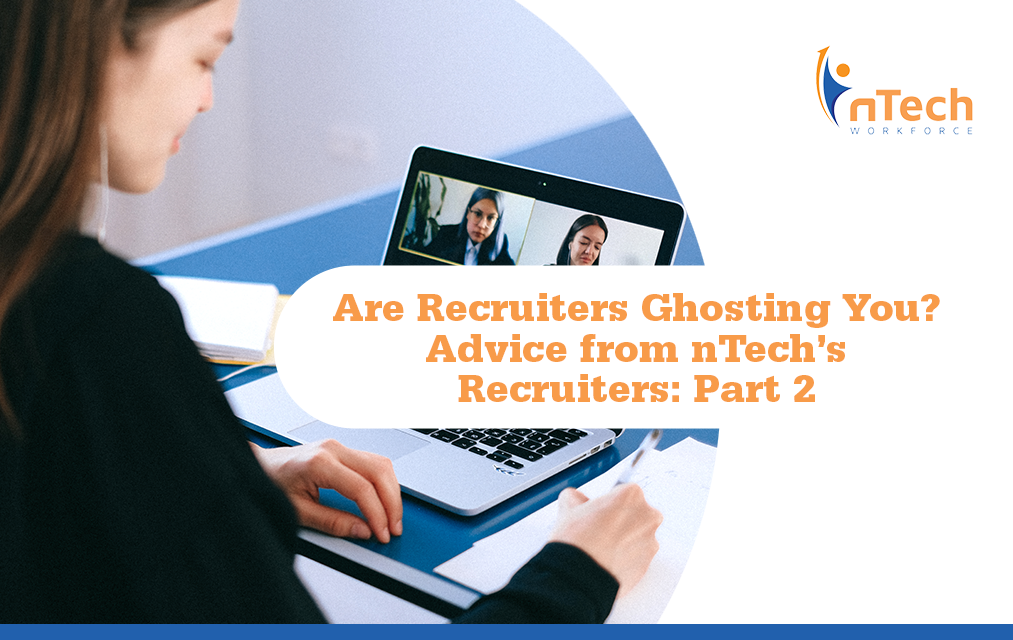Are Recruiters Ghosting You?
This article is the second part of our two-part article series on ghosting. In the last article, we focused on candidate ghosting, i.e., recruiters...
-1.png?width=303&height=403&name=Job%20Seekers%20Mega%20Menu%20(1)-1.png)
Check out our nSider Hub for all of nTech's staffing-related resources.

Ghosting is not a one-sided story, sometimes you ghost, and sometimes you get ghosted. It’s the same in the professional world, i.e., either an employer can ghost the candidate or vice-versa. This is part one of a two-part series on candidate ghosting. Each part will focus on one side of the story. In this article, we will discuss the process of a candidate ghosting an employer.
Candidate ghosting refers to the process in which candidates stop communication with the employer during the hiring process. They disappear from the hiring process without telling the employer why they are not interested in the role. According to 39% of hiring managers in the United States, candidate ghosting has become more common in the last two years.
So, why do candidates ghost companies? Many reasons explain this. A huge part is that candidates have more choices, and they often get multiple job offers and choose the one that best aligns with their needs and expectations. Lack of effective communication from the company and a bad reputation can also lead to candidate ghosting.
Tailor Stewart, Talent Acquisition Specialist at nTech Workforce, explains some reasons for such ghosting, “This might happen when candidates find a different opportunity that pays more, has better benefits, or offers more flexibility, such as 100% remote working. Candidate ghosting can also happen when a candidate suspects that the job or recruiting company is a scam; staffing & recruiting companies are often asked to provide additional information by clients – such as a form of ID or the last 4 digits of their social security number – which can sometimes appear as a red flag to candidates who haven’t experienced that in the past, and as a result causes them to lose trust and ghost the recruiter immediately. A lot of the time, the candidate may even agree to continue and agree to send the additional information over on the initial phone call and later stop responding.”
There are several steps employers can take to avoid candidate ghosting:
State job requirements at the beginning of the hiring process. Write a job description that clearly states the roles and responsibilities of candidates. Although this may not always work, it does help with some of the candidates who may experience hesitation about having to provide additional information.
Make the candidate feel that you are on their side. Tell them that you will communicate with them irrespective of the outcome of their application. If they do not meet the requirements, let them know that you will contact them if a suitable position opens in the future.
After you have received the candidate’s application, send a follow-up email detailing the process by which you will review their information for the initial qualifying round. This will keep the candidate engaged and interested in the role.
Communicate with your candidates regularly and efficiently but don’t be overbearing in your approach. The candidates will be frustrated if you are constantly contacting them without meaningful reasons. Stewart says, “Share relevant details such as speed of process if applicable. For example, if your client is very responsive and a quick decision-maker, sharing those details with the candidate will help keep them engaged and will set the position you’re interviewing for apart from others they may be considering.”
In the case of candidates ghosting companies, Stewart suggests, “If a candidate is not answering phone calls, a different form of communication, such as an email or text message, may provide the convenience a candidate needs to respond. There have been times when a candidate is unable to answer a call, and giving them an alternative form of communication will reengage them in the process. Don’t be afraid to try new ways to connect with them.”
At nTech Workforce, we engage candidates by reaching out to them step by step. By doing this, we avoid unnecessary communications to avoid overwhelming the candidate. With over a decade of experience, we are experts in engaging and retaining the most talented candidates.

This article is the second part of our two-part article series on ghosting. In the last article, we focused on candidate ghosting, i.e., recruiters...

On the whole, we know that as many as50% of candidates don’t work out through no fault of anyone involved. Some jobs just aren’t the right fit....

Regular performance evaluations for employees hold undeniable importance, impacting productivity and overall growth. This significance is amplified...